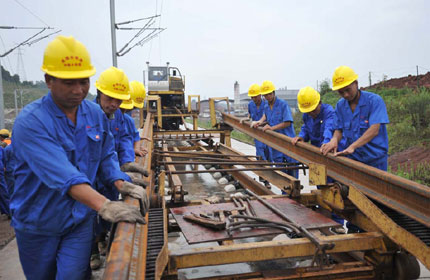Reform family planning system with deeds, not words
Updated: 2014-07-04 11:40
By Li Yang (chinadaily.com.cn)
|
|||||||||||
Lifting controls over births is a crucial decision that concerns the dignity of life and the livelihoods of many families. The family planning departments must have a clear-cut view and take concrete action to serve the people, says an editorial in the Southern Metropolis Daily. Excerpts:
The central government should require local authorities to be more flexible when dealing with couples who give birth to their second child after the central government said yes in principle but before local family planning departments translated the “yes” into action.
Last November, the central government agreed to allow a second child for many families that had only one child because of the family planning policy enforced in the country since the early 1980s.
The change means China will reform its family planning policy and the whole system executing the policy, under the pressure of a labor shortage and an aging society.
This is certainly good news for tens of millions of single-child families in the country. Some couples took the central government’s “yes” as official permission to have their second child at once, even before local authorities issued notices lifting the control.
Zhejiang, Anhui and Jiangxi provinces said “yes” in January, followed by Guangdong in March, and Shandong and Henan in May. Some regions have not yet clarified their attitudes.
More than 300 million people work and live in places outside their hometown. The different response times make a big difference. As long as the grassroots family-planning departments do not receive a green-light policy from the provincial authorities, they think they still have the power to impose a heavy fine in the form of a social assistance fee on couples violating one-child policies.
Social assistance fees, according to the law, refers to the money paid by couples for the government’s and society’s costs of taking care of children born after the first one. But the fee, which amounts to tens of billions of yuan nationwide, has fattened the whole family planning system. In the absence of effective supervision, the fee has become an incentive for grassroots family-planning officials to hold on to the old policy.
It explains why the reform of family planning meets such great resistance from within the system.
The family planning administration told the media recently local authorities need not punish those couples who jumped the gun.
The message came out after nearly 3,000 pairs of single-child couples who had already given birth to their second children sent a petition they had signed to the national family planning administration in late April.
The family planning authority should have made it a rule that the couples should not be fined from the moment the central government told the people about its attitude of pushing the envelope in the difficult reform, which faces resistance from vested interests.
It is high time the central government meted out a compulsory policy to abolish the disputed social assistance fee that has become a nightmare for poor couples and a cash cow for some local officials.
Otherwise, local governments will have enough incentive to delay the reform.
Related Stories
New generation of families with second child tackling unique parenting challenges 2014-06-03 01:44
Most Shenzhen hopeful second-child mothers in 30s 2014-04-08 16:27
Time to further ease family planning policy 2014-05-16 08:16
No timetable for family planning policy changes 2014-03-07 07:20
Today's Top News
Gambling costs World Cup fans their lives
US supports Ukraine's decision to suspend ceasefire
It's all about making a spectacle
China likely to see 7.5% growth in second quarter
Palace Museum feeling the squeeze of visitors
Myanmar pagoda replica given to China
US sends 300 more troops to Iraq over concerns
Hong Kong at the crossroads
Hot Topics
Lunar probe , China growth forecasts, Emission rules get tougher, China seen through 'colored lens', International board,
Editor's Picks

|

|

|

|

|

|





